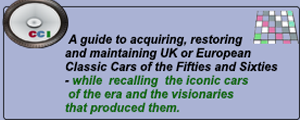
 It doesn’t mean that there won’t be a restorable car on the line, someday, somewhere that the owner has no real idea or interest of its value once it is restored. Anyone who is systematic enough to follow the inventories of car auctions might be lucky enough to pick up a bargain.
The steps involved in buying a classic car at auction are simple.
It will save a lot of time and potential aggravation when attending auctions is to have a more than approximate idea of the price range and model profile of the classic car, as well as the levels of restoration that the owner is prepared to do and can finance.
Preliminary stages must involve looking at the results of recent auctions and market trends to get an idea of how much the car to be purchased is liable to cost. Look for reliable auctions of classic cars in your area or on the Internet.
Although it really will be a “needle in a haystack” scenario.
Theoretically, the easiest, and therefore most expensive way to acquire a classic car for restoration, is to attend specialist classic car auctions also organised frequently, usually in the Midlands to the South of England, although there are auction houses throughout the UK.
It doesn’t mean that there won’t be a restorable car on the line, someday, somewhere that the owner has no real idea or interest of its value once it is restored. Anyone who is systematic enough to follow the inventories of car auctions might be lucky enough to pick up a bargain.
The steps involved in buying a classic car at auction are simple.
It will save a lot of time and potential aggravation when attending auctions is to have a more than approximate idea of the price range and model profile of the classic car, as well as the levels of restoration that the owner is prepared to do and can finance.
Preliminary stages must involve looking at the results of recent auctions and market trends to get an idea of how much the car to be purchased is liable to cost. Look for reliable auctions of classic cars in your area or on the Internet.
Although it really will be a “needle in a haystack” scenario.
Theoretically, the easiest, and therefore most expensive way to acquire a classic car for restoration, is to attend specialist classic car auctions also organised frequently, usually in the Midlands to the South of England, although there are auction houses throughout the UK.
![]()
 Any inspections carried out will usually be under the supervision of a staff member and might even include a short trial run within the auction house area- especially if the vehicle has a medium to high value.
One of the biggest dilemmas that a bidder will face at a classic car auction is how to accurately assess the vehicle’s value as each classic car is unique, depending on its condition, and there is no paperwork available that can give that much of a guide- especially as repairs will inevitably need to be made.
For that reason alone, it is always worthwhile to home in on these auctions that hold a “target vehicle” with a fixed price in mind that must never be budged from- otherwise, the car could be priced out of the market before a single bolt has been loosened.
Any inspections carried out will usually be under the supervision of a staff member and might even include a short trial run within the auction house area- especially if the vehicle has a medium to high value.
One of the biggest dilemmas that a bidder will face at a classic car auction is how to accurately assess the vehicle’s value as each classic car is unique, depending on its condition, and there is no paperwork available that can give that much of a guide- especially as repairs will inevitably need to be made.
For that reason alone, it is always worthwhile to home in on these auctions that hold a “target vehicle” with a fixed price in mind that must never be budged from- otherwise, the car could be priced out of the market before a single bolt has been loosened.
 The internet age has meant the rise of online auctions. Online auctions are very convenient - although it will take a very brave or knowledgeable restorer to make a successful bid and pick up a reasonable vehicle.
The internet age has meant the rise of online auctions. Online auctions are very convenient - although it will take a very brave or knowledgeable restorer to make a successful bid and pick up a reasonable vehicle.
 On the upside, online auctions are a virtual encyclopaedia of car values for the beginner restorer, with dozens if not hundreds of vehicles from every spectrum on the industry on offer 24/7 with a number being sold.
By following the bidding and sale prices, which are published, a restorer can build up a data base of car values that should serve them well for the future.
On the upside, online auctions are a virtual encyclopaedia of car values for the beginner restorer, with dozens if not hundreds of vehicles from every spectrum on the industry on offer 24/7 with a number being sold.
By following the bidding and sale prices, which are published, a restorer can build up a data base of car values that should serve them well for the future.
 Remember that it can be hard to get a good deal on a classic car at an auction, as there will be a lot of experienced around who are liable to puh the price up. It's important to be well-prepared, stick to a budget, and make decisions based on study and careful thought.
Buying a classic car at an auction can be a fun and satisfying experience, but those who want to take this path should be well-prepared to make sure their purchase goes well and they neither overpay or buy a pig in a poke.
Remember that it can be hard to get a good deal on a classic car at an auction, as there will be a lot of experienced around who are liable to puh the price up. It's important to be well-prepared, stick to a budget, and make decisions based on study and careful thought.
Buying a classic car at an auction can be a fun and satisfying experience, but those who want to take this path should be well-prepared to make sure their purchase goes well and they neither overpay or buy a pig in a poke.
Back to the homepage- and don't spare the horsepower.


